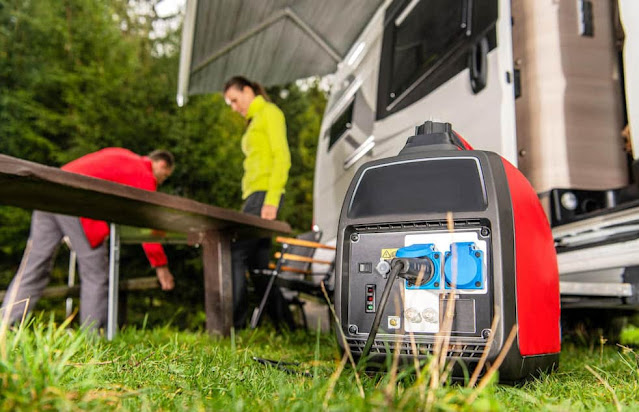The California generator ban and RV travellers
Russ De Maris | gls55 holdings ltd
The decision by the State of California Air Resources Board (CARB) has angered
RV manufacturers and worried would be RV travellers alike. But the seeming
generator ban may mean much more to industry than to RVers on the ground.
What’s behind the ruling?
CARB was ordered by law to develop new rules that would reduce air pollutant-emissions from “small engines” to zero by 2035. When we say “small engines,” the agency targeted small engines on equipment like lawn mowers, leaf blowers, weed eaters. Even gas-powered pressure washers were roped in. And yes, a generator ban got mixed in, as well. Small emergency generators, as used by families and small businesses, were exempted, provided they are permanently mounted or “fixed” units.
The agency trotted out statistics that show that SORE (small off-road equipment) produces huge amounts of air pollutants. These include particulates and nitrogen oxide. Admittedly, these pollutants do take a serious toll on health. Since the automotive industry was given the mandate to clean up tailpipe emissions, a major chunk of California’s air pollution comes out of SORE. Interestingly, though, CARB admits only about a fifth of that SORE-produced air pollution comes from small generators. Depending on how their figures are calculated, that in itself might be more than the reality.
How does the rule work?
Those hit first by the new rule would seem to be folks in the lawn care business. By 2024, no more will gas-fired lawn equipment be allowed for sale or lease in California. Sort of. Through a system of “credits,” companies may be able to continue to build and sell them for a time. But in the main, if you want to buy lawn equipment, you’ll largely be forced into buying ZEE. That stands for Zero Emissions Equipment, which many California residents already have. Battery operated, rechargeable stuff. But professional lawn care operators say the number of battery packs they’ll need to lug with them to get through a full day’s work will have a major impact on them.
But what about the generator ban? CARB ruled that generator manufacturers will need a little more time to deal with a zero emissions standard. Testimony from generator manufacturers during a CARB hearing on Thursday spoke volumes. And to be sure, the RV industry had plenty of folks testify. But with a time-limit of two minutes per speaker, laying out a succinct case against a ban didn’t have much of a chance to change minds.
For “portable” generators, come their model year 2024, new generators will have to have significantly less air pollution out the tail pipe. By 2028, only ZEE generators can be sold.
Theoretically, these are zero-emissions equipment generators. For some uses, they might be practical. Imagine a power inverter connected to a large battery bank. Plug in for pollution-free, absolutely quiet shore power. For many RVers, this would be idyllic. But the devil is in the details. There’s a finite amount of power that a battery can store. Once it’s used up, the ZEE generator will need to be lugged to a source of shore power and recharged. That’s a major crimp for some RVers, or a deal-killer for others.
So what does the new rule mean for any RV?
For now, absolutely nothing changes. RV retailers in the Golden State can go on selling RVs with on-board generators to their heart’s content. But by 2028, the music stops. Industry representatives complained long and hard. They said this could easily spell the shutdown of a third of the state’s dealerships once the new rule goes into effect. Others testified that RV dealers would relocate across the border in neighboring states and sell RVs with smoggy generators.
The RV industry made a concerted effort to get CARB to rule that RV-mounted generators should be classified as “stationary.” This would have exempted them from the new rules. Industry threw towable RV owners under the bus with their stand, but no matter – CARB wouldn’t hear the argument anyway.
But for you and me, the new rules will take a while to have much of an effect. Even when 2028 rolls around, a “generator ban” there won’t really be. For folks visiting California, your generator, no matter how old, is still lawful. For California resident RVers, your existing generators can continue to be used – and repaired. That goes on until they finally die their own death. However, with the increase of ZEE equipment, it will be interesting to see if there’s an impact on repair shops in California. Will they still have service departments that can handle repairs? The testimony of some equipment retailers suggests some are downright worried that they’ll be able to keep service departments operating.
Keep in mind, all of these new rules apply only to GASOLINE-powered units. If you fancy an RV with a diesel-fired generator, this so-called generator ban has no effect.
Are there alternatives?
But at this point, unless California decided to try an outright generator ban, this is needless worrying. If your existing RV generator is up and running, keep it maintained and happy motoring. But if you see a new generator need in your future, either chassis mounted or truly portable, you might be ahead to do it before 2024, when prices will likely go up.
If you choose to comment, be kind. Nasty comments will be deleted and readers who made them banned from commenting again.




Comments
Post a Comment